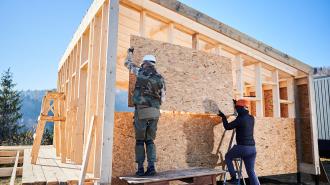North Carolina-based startup Plantd believes a material you casually tread upon today holds the potential to decarbonize the construction industry: grass.
The company’s product — an innovative, durable construction material created from fast-growing grass — made the rounds last year in a video posted on LinkedIn by co-founder and CEO Josh Dorfman.
Two different kinds of the common construction material, the “oriented strand board” or OSB, lay across an I-beam. A sledgehammer falls head first into the middle of both, snapping the wood OSB while bouncing off Plantd’s grass-based board.
Plantd believes their grass-based construction boards are lighter, stronger, and more environmentally friendly than ones made from wood.
With former SpaceX engineers leading their technical and operations teams, Plantd has now closed its Series A investment round, TechCrunch reported.
“We can quickly and profitably remove carbon from the atmosphere and lock it away,” Dorfman told Forbes, “without relying on carbon credits to underwrite our business model.”
“This works because we turn carbon, in the form of rapidly growing perennial grass, into drop-in replacement materials for homebuilders that are cost-competitive, stronger, more moisture-resistant, and require no alternative installation techniques.”
The costs of a built environment: Construction is a big driver of carbon emissions; it is estimated that 4.7 gigatons or 13% of the world’s CO2 emissions each year come from construction and its materials, making it a prime target for decarbonization.
There’s a tricky part to this, though: demand for new construction is rising, and building is likely the best way out of the housing crisis. If we cannot slow or stop construction, then, efforts need to be made to make it greener.
Researchers are turning their attention to some of the primary culprits: steel, cement, concrete.
“The global economy produces and transports 4.1 gigatons of concrete, 1.9 gigatons of steel, and 0.8 gigatons of timber products every year,” Dorfman told Forbes.
The panels are made from fast-growing perennial grasses which can capture more carbon faster than trees while using less land.
Changing OSB design: The material Plantd hopes to replace, wood-based OSB, is made from wood strips and glue, much like plywood, and is commonly used in floors, roofs, and furniture. OSB is sometimes promoted as a sustainable alternative to plywood because it does not require old growth forests to make.
Dorfman told Forbes that the structural panel market — massive, well-established, and with room for innovation — is a “fantastic starting point” for decarbonized products “that solve real problems for builders around durability, affordability, and sustainability.”
The wood usually used for OSB can take a decade or so to grow, but with panels made from fast-growing perennial grass, Plantd says theirs will capture more carbon faster than trees and use less land, Dorfman told TechCrunch.
The company characterizes their grass-based design as stronger, lighter, more resistant to moisture, and actually carbon negative when compared to OSB, and selling for the same price.
Those claims have yet to be proven on a broad scale, TechCrunch pointed out — the panels are still in the prototyping stage, and the company is being cagey about the exact blend of grasses they are made from.
We’d love to hear from you! If you have a comment about this article or if you have a tip for a future Freethink story, please email us at tips@freethink.com.
